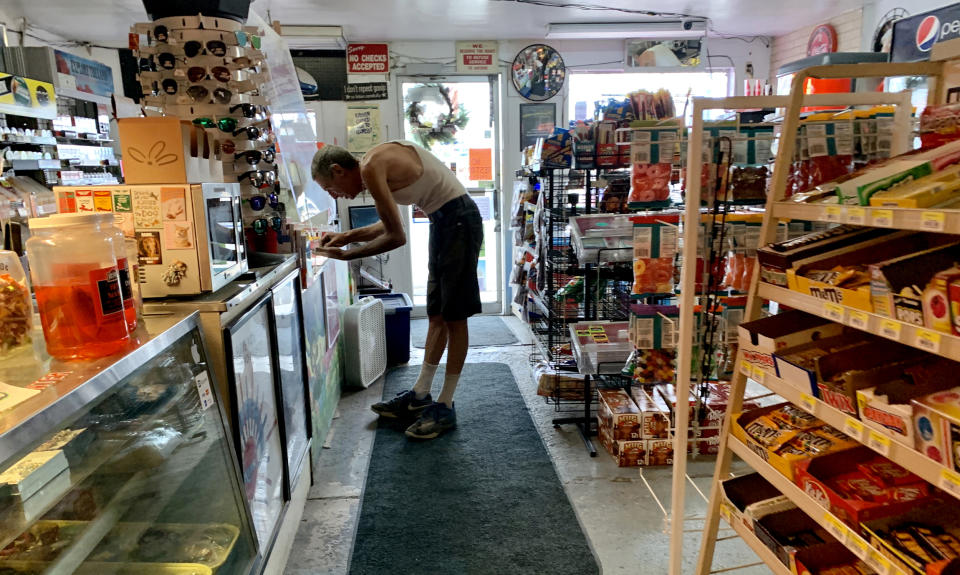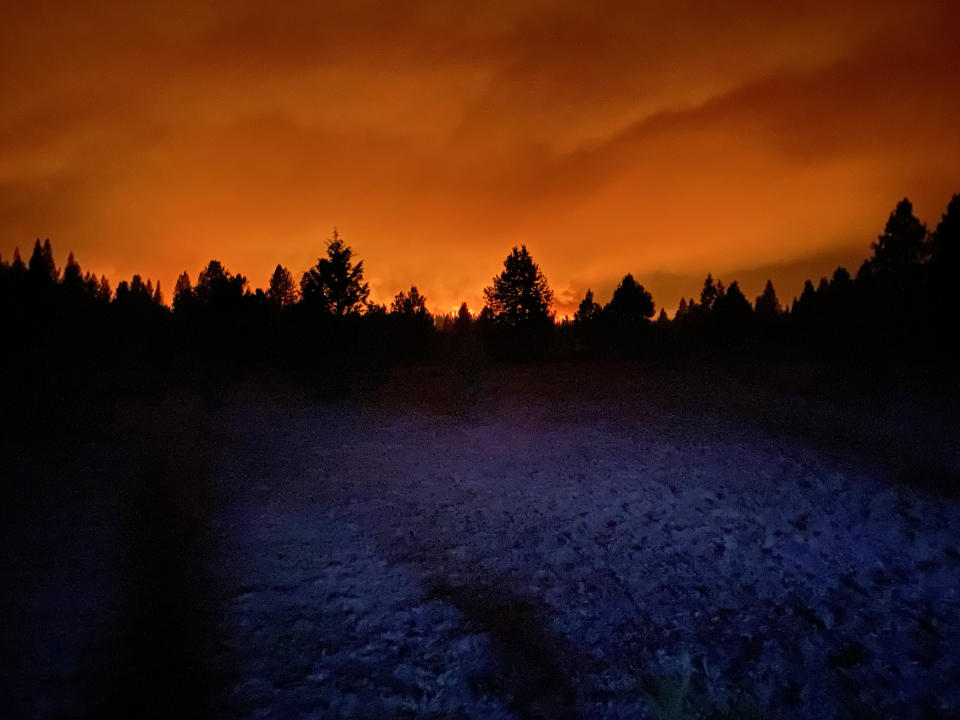Exhaustion and tough decisions pile on victims of Oregon's giant Bootleg Fire
KLAMATH FALLS, Ore. — Rita Nalette climbed out of the red truck she and her small dog have been sleeping in since the Bootleg Fire crept up to her 10-acre property in the Fremont-Winema National Forest and threatened to devour her home.
“Did I tell you Baby caught a bear once?” she said, picking up the dog and sticking a .38 caliber revolver into its holster.
Nalette and Baby have been parked outside Palomino Deli & Mini Mart in the unincorporated town of Beatty, near the California border, for several weeks. A self-described “off-the-grid mountain woman,” she plans to camp in her truck for several more days until the threat of lightning passes.
Each strike adds another obstacle to an already tricky fight against wildfires. Lightning, which officials believe started the Bootleg Fire on July 6, was responsible for some of the biggest wildfires in recent history, including last year’s August Complex in Northern California that charred more than 1 million acres and destroyed nearly 1,000 structures.
Sara Palomino and her husband, who own the only deli and convenience store in Beatty, were one of nearly 200 people who recently lost their homes in the Bootleg Fire. For weeks, they have been sleeping in the back of their store while keeping their business afloat.

“Everybody comes to her,” Nalette said of Palomino, who spoke with NBC News but declined to be quoted saying that she and her husband are too traumatized to share their experience.
“This is the country where we’re all basically strangers to each other,” Nalette said. “And then all of a sudden, they’re your brothers and sisters. Isn’t that something?”
It has taken thousands of firefighters nearly a month to secure communities along the southern and the northeastern perimeters of the Bootleg Fire, which has consumed more than 413,000 acres across a largely remote and sparsely populated swath of southern Oregon. It was 74 percent contained as of Sunday, a jump from 56 percent containment a day earlier, but red flag warnings remain in effect as residents and firefighters brace for the potential of more lightning.
Last week, thunderstorms sparked at least 22 fires in central Oregon, The Oregonian reported, and fire officials worried more could ignite. Full containment of the Bootleg Fire isn't expected until the fall.

The Fremont-Winema National Forest and much of the land surrounding it belonged to the Klamath Tribes until 1864 when a treaty was signed with the federal government to secure hunting, fishing, gathering and water rights. Nearly 22 million acres of land was ceded to the United States and the tribes - comprising the Klamath, Modoc and Yahooskin-Paiute people - retained 1.5 million acres.
The tribes lost control of that land in 1954 but have kept a close connection to it over the years. Clayton Dumont, an elected member of the Klamath Tribal Council, called the Bootleg Fire “heart-wrenching.” The inferno drove out deer, a staple of the traditional diet, and incinerated lands still used by some for prayer and spiritual practices, he said.
The fire also compromised waterways crucial for the survival of several types of fish endemic to the region. The C’waam and Koptu, or the Lost River and shortnose sucker fish, are already near extinction. An integral part of the tribal diet, destruction of these "first foods" is a painful symbol of the battle tribes have fought for generations to retain their way of life, he said.
“We think of ourselves as being part of the land,” he added. “We have awe and wonder and respect for things that are much more complex than us, and the larger society feels that it has dominion.”
Dumont said that kind of mentality informed decades of poor forest management, including suppressing healthy fires that could have helped to keep forests thinned and less likely to explode into megafires. Now, tribal culture and history are threatened as wildfires become harder and harder to contain, he said.
Living under the constant risk of wildfire has also taken its toll on the non-Indigenous people who live in the backwoods settlements and rural towns dotting the fire’s perimeter. Smoke lingers heavy in the air and small spot fires serve as a grim warning that dry vegetation, parched by drought, could erupt into flames at any moment.
“I’m tired,” said Leda Hunter, president of the Bly Community Action Team, which operates a donation center for Bootleg Fire victims. “I’ve been handing out food, clothing, shovels, whatever people need. Bly is a real caring community. Everybody steps up.”

Bly is about 13 miles east of Beatty, past roadside signs thanking firefighters and flags proclaiming “Don’t tread on me.” On Saturday, residents pulled into the parking lot of a local volunteer fire station and loaded essentials onto trucks and vans.
Inside, Kari Beckler baked pizza from scratch with 25 pounds of pepperoni recently donated by community members.
She and her husband, Steven, relocated to the area from New Mexico about six weeks ago to be closer to their grandchildren. They purchased a 20-acre plot in January and had been shuttling back and forth from New Mexico for several months while they waited to secure a permit to construct their new home. It arrived the same week the Bootleg Fire destroyed about $30,000 worth of tools and building materials.
“Our trees are just black sticks now," Steven said.

The Becklers have been living in an RV park for about three weeks after finding that hotel prices in the nearest city, Klamath Falls, about an hour’s drive away, skyrocketed during the fire.
“It should be illegal,” Steven said. “Before, we never paid more than $75 a night and all of a sudden, it’s $350 or so? That’s wrong.”
With no insurance for their undeveloped plot, the couple faces an expensive dilemma: wait for the smoke to clear and begin building their dream home on land blackened by fire or find a new area where to retire.
“We have nowhere else to go,” he said. “Once you’ve lived in the country, you can’t go back to the city.”
Down the road in Beatty, Nalette takes a long puff of a vanilla-flavored cigarette while standing outside the Palomino store. She waves a mystery novel in one hand, proclaiming she has all she needs for now inside her truck.
When asked if the Bootleg Fire has made her rethink living alone in the forest, she shrugs and shakes her head. Nalette will return to her home as soon as the smoke dissipates, until the next fire comes.

